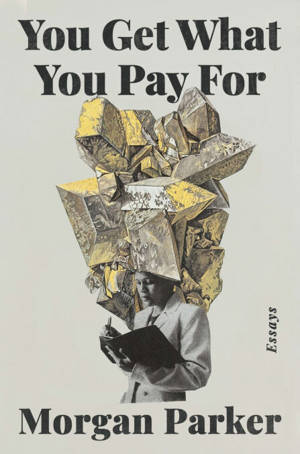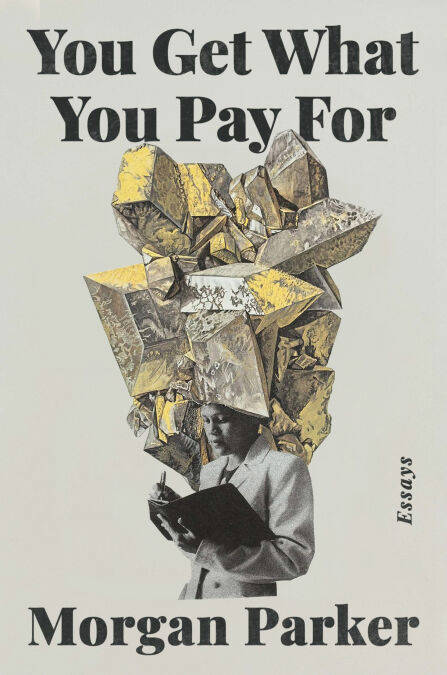
Bedankt voor het vertrouwen het afgelopen jaar! Om jou te bedanken bieden we GRATIS verzending (in België) aan op alles gedurende de hele maand januari.
- Afhalen na 1 uur in een winkel met voorraad
- In januari gratis thuislevering in België
- Ruim aanbod met 7 miljoen producten
Bedankt voor het vertrouwen het afgelopen jaar! Om jou te bedanken bieden we GRATIS verzending (in België) aan op alles gedurende de hele maand januari.
- Afhalen na 1 uur in een winkel met voorraad
- In januari gratis thuislevering in België
- Ruim aanbod met 7 miljoen producten
Zoeken
Omschrijving
In her “witty and searing” first essay collection, award-winning poet Morgan Parker examines “the cultural legacy of Black womanhood and the meaning of finding ‘well-being’ in a world that wasn’t built for you” (Vogue).
“Riveting and deeply personal . . . filled with poignant insights.”—Cosmopolitan
LAMBDA LITERARY AWARD FINALIST • A BEST BOOK OF THE YEAR: Electric Lit, Chicago Public Library, Kirkus Reviews
Dubbed a voice of her generation, poet and writer Morgan Parker has spent much of her adulthood in therapy, trying to square the resonance of her writing with the alienation she feels in nearly every aspect of life, from her lifelong singleness to a battle with depression. She traces this loneliness to an inability to feel truly safe with others and a historic hyperawareness stemming from the effects of slavery.
In a collection of essays as intimate as being in the room with Parker and her therapist, Parker examines America’s cultural history and relationship to Black Americans through the ages. She touches on such topics as the ubiquity of beauty standards that exclude Black women, the implications of Bill Cosby’s fall from grace in a culture predicated on acceptance through respectability, and the pitfalls of visibility as seen through the mischaracterizations of Serena Williams as alternately iconic and too ambitious.
With piercing wit and incisive observations, You Get What You Pay For is ultimately a portal into a deeper examination of racial consciousness and its effects on mental well-being in America today. Weaving unflinching criticism with intimate anecdotes, this devastating memoir-in-essays paints a portrait of one Black woman’s psyche—and of the writer’s search to both tell the truth and deconstruct it.
“Riveting and deeply personal . . . filled with poignant insights.”—Cosmopolitan
LAMBDA LITERARY AWARD FINALIST • A BEST BOOK OF THE YEAR: Electric Lit, Chicago Public Library, Kirkus Reviews
Dubbed a voice of her generation, poet and writer Morgan Parker has spent much of her adulthood in therapy, trying to square the resonance of her writing with the alienation she feels in nearly every aspect of life, from her lifelong singleness to a battle with depression. She traces this loneliness to an inability to feel truly safe with others and a historic hyperawareness stemming from the effects of slavery.
In a collection of essays as intimate as being in the room with Parker and her therapist, Parker examines America’s cultural history and relationship to Black Americans through the ages. She touches on such topics as the ubiquity of beauty standards that exclude Black women, the implications of Bill Cosby’s fall from grace in a culture predicated on acceptance through respectability, and the pitfalls of visibility as seen through the mischaracterizations of Serena Williams as alternately iconic and too ambitious.
With piercing wit and incisive observations, You Get What You Pay For is ultimately a portal into a deeper examination of racial consciousness and its effects on mental well-being in America today. Weaving unflinching criticism with intimate anecdotes, this devastating memoir-in-essays paints a portrait of one Black woman’s psyche—and of the writer’s search to both tell the truth and deconstruct it.
Specificaties
Betrokkenen
- Auteur(s):
- Uitgeverij:
Inhoud
- Aantal bladzijden:
- 224
- Taal:
- Engels
Eigenschappen
- Productcode (EAN):
- 9780525511458
- Verschijningsdatum:
- 11/03/2024
- Uitvoering:
- E-book
- Beveiligd met:
- Adobe DRM
- Formaat:
- ePub

Alleen bij Standaard Boekhandel
+ 16 punten op je klantenkaart van Standaard Boekhandel
Beoordelingen
We publiceren alleen reviews die voldoen aan de voorwaarden voor reviews. Bekijk onze voorwaarden voor reviews.









